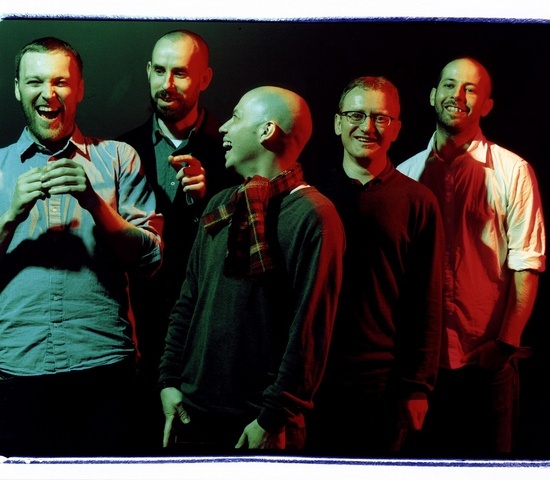A little over a decade ago, Mogwai made a trip to the Hiroshima Peace Memorial, located at the epicentre of the explosion of the first atomic bomb on August 6th 1945. "I’ve always been against nuclear weapons but seeing what they do really sharpened it," says Mogwai’s Stuart Braithwaite of experiencing the still-ruined structure known as the A-Bomb Dome. "The building that it exploded above gives you an idea of the devastation – you get the scale of it, there are things like melted tricycles. It really hits home how evil nuclear weapons are – there’s no other word for it." His bandmate Barry Burns agrees: "it was one of those days in my life that forever changed how deeply I thought about something."
This hugely affecting visit to the site of one of humanity’s darkest moments is at the heart of the inspiration for Mogwai’s soundtrack to Mark Cousin’s documentary Atomic – Living In Dread & Promise, performed tonight at the Barbican. "When we were asked about the project it was something we felt we had a connection to because the film was going to be shown on the 70th anniversary on the bombings," says Braithwaite; "we wanted to be part of something that let as many people as possible know about what happened".
The soundtrack, the first Mogwai recording following the departure of founder member John Cummings, evolved in close collaboration with Cousins. The film is constructed from archive footage to explore the dark flipside of the potential of nuclear energy, from Hiroshima to Fukoshima via the Chernobyl and Three Mile Island accidents. After initial discussions, Cousins and the group worked on ideas in "a collaborative process, to-ing and fro-ing". It was a different way of working from Mogwai’s previous two soundtracks, for the 2006 biopic of French footballer Zidane and TV series Les Revenants. In the former Braithwaite says they were left alone to do what they wanted, whereas in the case of the are-they-undead-or-are-they-not-undead horror show "it was a little bit more strictly structured as there was a narrative". In common with all three projects however has been the close relationship between the band and directors throughout. "They’ve all been a little different to work on and we’ve lucked out with directors (or creators) trusting our judgement," says Burns; "it did seem to go smoothly so hopefully we’re always learning and being more economical the more we do it."
The film’s schedule necessitated a fast writing and recording process with the band "having to think on our feet quite a lot". The pressure, combined with having to endlessly re-watch archive footage of atomic explosions and their aftermath, meant that "the whole thing has been bloody heavy", according to Braithwaite. "I think we’re going to try and do the My Little Pony or 3D kittens movie next". Burns adds that "I thought maybe I would become fatigued or desensitised to the images but no, it’s always a tough watch" However Braithwaite points out that the most intense parts of the film don’t have music, with Cousins using space and silence for impact. "We were quite conscious to not be too bombastic because the subject matter and the images were genuinely shocking," Braithwaite explains. "To be honest solemn grimness comes to us quite easily, it’s our natural sound – the challenge was doing something good enough".
When it comes to performing the soundtrack live, Mogwai have to play fairly close to their original score, though there are passages that become more freeform. In a recent performance at Berlin’s Admiralspalast concert hall the guitars raged as harsh and brittle as at any Mogwai gig in years. The resonance of history and geopolitics that created and sustains nuclear weapons was never far away – the band’s soundman Kenny was operating the desk from a balcony box originally designed for Adolf Hitler.
Although Braithwaite is a vocal proponent of Scottish independence, in part due to the stationing of the Trident submarine fleet at Faslane, the band have until now eschewed the directly political in their music. Atomic, Braithwaite says, is different largely due to the Mogwai’s belief that nuclear weapons are an unnecessary evil, and a frustration that they’re currently not a pressing issue with the general public. "There seems to be less talk about it, it’s quite strange," Braithwaite says, hoping that the Atomic soundtrack and album might spread awareness of the terrible legacy of the nuclear age. "The way people talk about nuclear weapons in a really blasé way really appalls me – you are talking about things that cost billions of pounds that are designed to wipe out millions of people’s lives in a second. Then there are politicians who claim to be Godly – I can’t think of many things less Godly than spending money that they could spending on feeding people or hospitals rather than killing everyone".
There are limited tickets still available for tonight’s performances, please visit The Barbican website for information. This feature is the programme notes for the event


